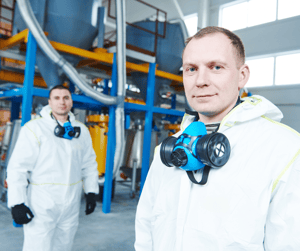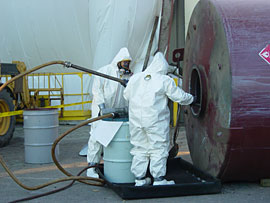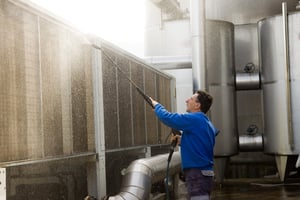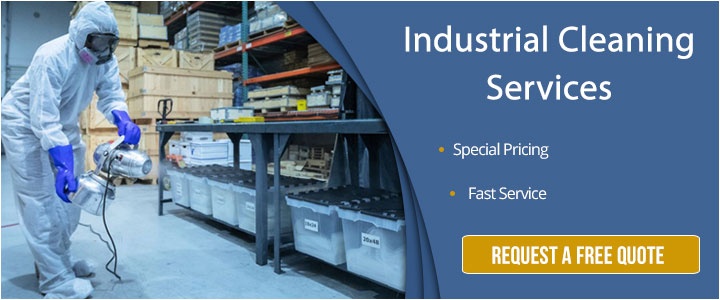Chemical manufacturers have very specific needs when it comes to maintaining and cleaning their equipment and facilities.
Acquiring the tools and expertise needed can cost significantly more than simply hiring a qualified local vendor. Outsourcing cleaning services to a skilled industrial cleaning company can save time, money and headaches.
However, before you perform a Google search for industrial cleaning services, it’s a good idea to assess your facility’s specific requirements and fully understand the scope of work needed. Here is what you need to know before you hire a cleaning company for your chemical manufacturing plant.
Chemical Manufacturers Have Specific Cleaning Needs
It can be a challenge for chemical manufacturers to find industrial cleaning services because of the hazardous nature of the material that they work with and ultimately manufacture. The use of harmful products and chemicals can contaminate buildings—creating unsafe working conditions for workers and guests alike.
of the material that they work with and ultimately manufacture. The use of harmful products and chemicals can contaminate buildings—creating unsafe working conditions for workers and guests alike.
In chemical manufacturing, several areas or projects may require specialized cleaning services due to the complex nature of the operations and the materials involved. Here are a few examples of areas of your operations that may need industrial cleaning.
Equipment Contamination Control
Chemical reactors and vessels must be thoroughly cleaned to prevent cross-contamination between different batches or products, especially when switching from one chemical process to another.
Residues in pipelines and valves can also affect the quality of the chemical products and the efficiency of the process. Regular cleaning is necessary to maintain operational standards.
Handling Hazardous Materials
Handling and cleaning areas exposed to toxic chemicals require specialized knowledge and equipment to ensure safety and compliance with health regulations. Corrosive chemicals can also damage equipment if not properly cleaned, leading to costly repairs and potential safety hazards.
Maintaining Cleanroom Standards
Certain chemical manufacturing processes require cleanroom conditions to avoid contamination. Specialized cleaning services ensure that these environments meet stringent cleanliness standards.
Residue And Byproduct Management
Some chemical reactions produce byproducts that need to be meticulously removed to prevent interference with subsequent processes or products. Over time, chemical processes can also lead to the buildup of sludge and scale, which require specialized cleaning techniques to remove.
Equipment Longevity And Efficiency
Regular cleaning and maintenance of critical equipment, such as heat exchangers and distillation columns, help maintain their efficiency and prolong their lifespan. Clean equipment also operates more efficiently, leading to optimized production processes and reduced downtime.
Cleaning Techniques Used In Chemical Manufacturing Plants
In chemical manufacturing plants, industrial cleaning processes are employed to ensure equipment and facilities are maintained effectively.
One industrial chemical cleaning solution is tank cleaning, which often involves human entry into the tank for scrubbing and cleaning residues that require detailed manual attention. Industrial tank cleaning services are highly specialized and may be required for a variety of reasons, from swapping contents in the tanks to maintenance issues.
Clean-In-Place (CIP) systems are also widely used to clean the interior surfaces of pipelines, vessels and process equipment without disassembly. Automated CIP systems circulate cleaning solutions through the equipment, ensuring thorough cleaning without manual intervention. This process often includes rinsing and flushing with water or solvents to remove residues and contaminants.
High-pressure water jetting, or hydro blasting, utilizes high-pressure water jets to remove stubborn residues, scale and contaminants from surfaces, equipment and piping. This method is particularly effective for heavy-duty cleaning tasks.
and contaminants from surfaces, equipment and piping. This method is particularly effective for heavy-duty cleaning tasks.
Other industrial cleaning solutions may include:
- Ultrasonic cleaning, which employs high-frequency sound waves to create cavitation bubbles in a cleaning solution, effectively cleaning intricate parts and components without disassembly
- Solvent cleaning methods, such as solvent immersion and solvent wiping, involve using solvents to dissolve grease, oils and other contaminants
- Steam cleaning that uses high-temperature steam to sanitize and remove residues from equipment surfaces, making it particularly effective for grease and oil removal
- Dry ice blasting, or CO2 pellet blasting, which uses dry ice pellets accelerated by compressed air to clean surfaces
- Foam cleaning, which involves applying cleaning agents mixed into a foam that then clings to vertical and overhead surfaces, allowing longer contact time for cleaning agents to act
- Industrial vacuum systems that are used for vacuum cleaning to remove dust, powders and small debris from equipment and work areas
- Biodegradable cleaning solutions that utilize eco-friendly cleaners and are safe for the environment and personnel
- Blowdown cleaning, which involves using compressed air or steam to blow out dust, debris or small particles from pipelines and equipment
Filtration and flushing are combined in some cleaning operations, where filtration systems remove particles and contaminants from fluid systems during the flushing process.
These various cleaning methods are selected based on the type of residue, the material of the equipment, safety considerations, and the specific requirements of the chemical manufacturing process. Properly executed, these cleaning methods help maintain the efficiency, safety and compliance of the manufacturing plant.
Commercial Cleaning Vs. Industrial Cleaning Services
It is crucial for chemical manufacturers to find a specialized COMMERCIAL INDUSTRIAL CLEANING SPECIALIST who has the experience and trained workforce equipped to work in this type of environment.
who has the experience and trained workforce equipped to work in this type of environment.
Cleaning a chemical manufacturing facility is not the same as cleaning a non-hazardous manufacturing facility. These sites are usually filled with acids, corrosives and/or flammable materials, and a wrong step can cause catastrophic problems.
Commercial cleaning and industrial cleaning services differ significantly in scope, environments, techniques, equipment and expertise. Commercial cleaning focuses on maintaining cleanliness and hygiene in public or business spaces such as offices, retail stores, schools and hotels.
These tasks are typically performed using standard cleaning tools and supplies like vacuum cleaners, mops, brooms, cleaning cloths, and basic cleaning agents. The expertise required for commercial cleaning involves general cleaning knowledge and basic safety training.
In contrast, industrial cleaning addresses the more complex and rigorous needs of industrial environments like factories, warehouses, power plants, manufacturing facilities and chemical plants.
The cleaning tasks in these settings are heavy-duty and can include:
- Machinery cleaning
- Equipment degreasing
- Tank and vessel cleaning
- High-pressure washing
- Hazardous waste cleanup
- Maintaining compliance with stringent safety and environmental regulations
The expertise and training required for industrial cleaning are more specialized compared to commercial cleaning. Workers need extensive knowledge about the specific industry, types of equipment and safety protocols. This includes understanding the properties of substances they are cleaning, such as chemicals, oils and hazardous materials.
Training for industrial cleaning is extensive, involving safety training, handling hazardous materials, compliance with industry-specific regulations, and sometimes certifications for using particular equipment or techniques.
The health and safety considerations in industrial cleaning are stringent due to the higher risks involved. Industrial cleaning companies must be able to safely handle the hazardous chemicals and by-products created in the manufacturing process.
What To Look for In An Industrial Cleaning Company
A qualified industrial cleaning service that is capable of cleaning a chemical manufacturing facility should be hazardous waste certified. Hazardous waste is generated not only in the manufacturing process, but often during the cleaning process as well.
Your vendor must be able to not only clean your facility, but should be licensed and qualified to dispose of the hazardous waste streams generated during the cleaning process, such as the wastewater contaminated with the cleaning agents and residual chemicals.
A qualified cleaning specialist should be equipped to provide pressure washing and decontamination services and be able to vacuum pump wastewater.
Make sure to get a free quote for the work to be performed. Depending upon the type of work, it may involve a pricing structure that is customized to your facility and equipment, as well as the square footage or the amount of work that needs to be done.
Most commercial cleaning services that handle this type of work will provide free estimates and may also offer a contract for services.
Verify that your selected vendor has the necessary insurance documents to cover its employees and the work being performed, and make sure that any company you are considering has the proper state and federal licensing including EPA, DTSC (State of California) and Department of Transportation to handle any hazardous waste created in the cleaning process.
Ultimately, choosing the right industrial cleaning service ensures a safe, compliant and efficient chemical manufacturing facility.
- SEO Powered Content & PR Distribution. Get Amplified Today.
- PlatoData.Network Vertical Generative Ai. Empower Yourself. Access Here.
- PlatoAiStream. Web3 Intelligence. Knowledge Amplified. Access Here.
- PlatoESG. Carbon, CleanTech, Energy, Environment, Solar, Waste Management. Access Here.
- PlatoHealth. Biotech and Clinical Trials Intelligence. Access Here.
- Source: https://blog.idrenvironmental.com/industrial-cleaning-for-chemical-manufacturers

